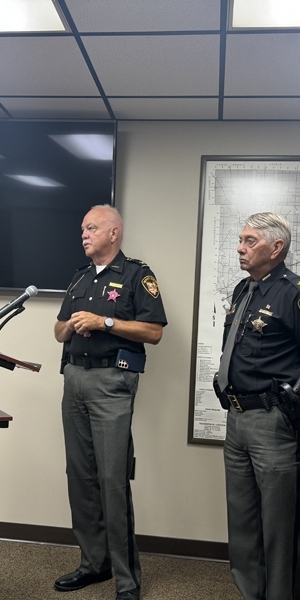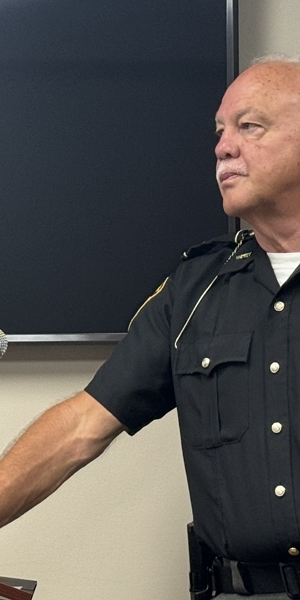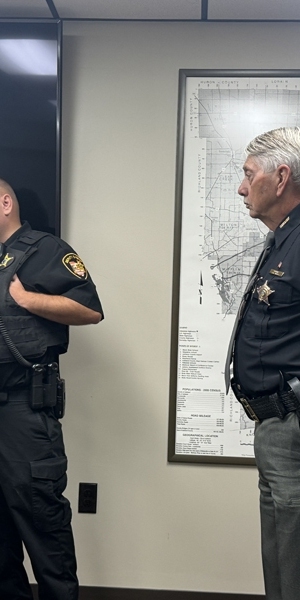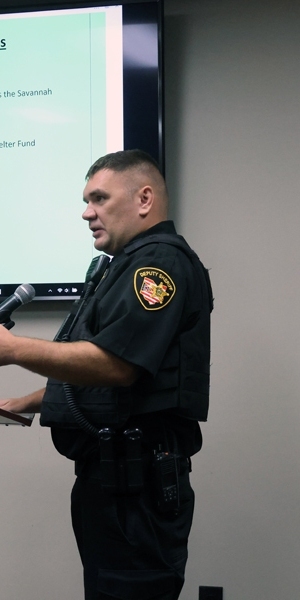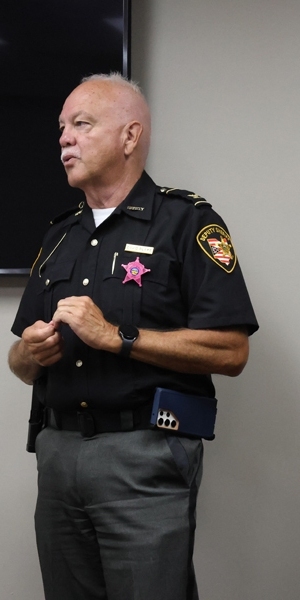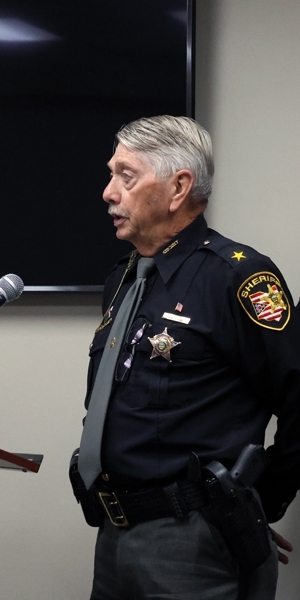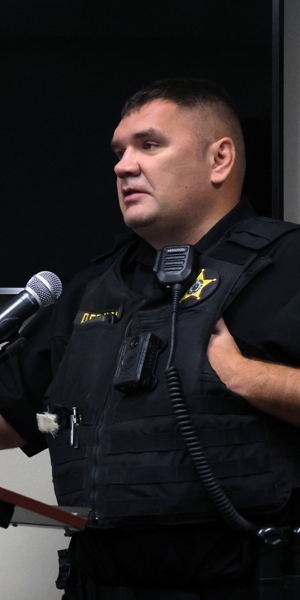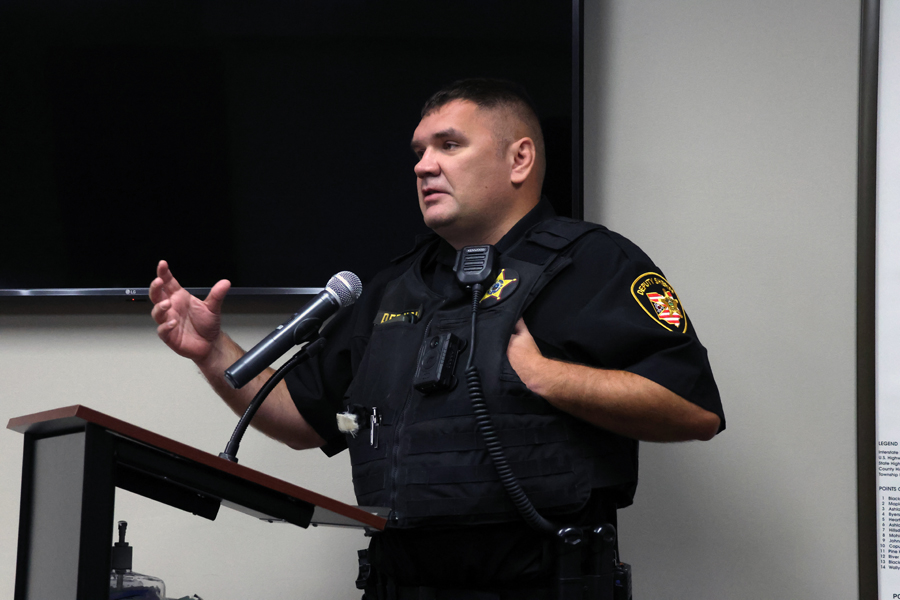
ASHLAND, OH— In a this morning’s meeting with the Ashland County Commissioners, Deputy Hall of the Ashland County Sheriff’s Office provided an insightful 90-day update on his new role as the county’s dog warden. The presentation highlighted significant strides made in dog licensing, shelter operations, and community relations, underscoring the positive impact of strategic community policing initiatives.
Deputy Hall began his address by expressing gratitude to Sheriff Risner, Chief Blake, and Captain Sims for their support, which he credits with enabling a flexible approach to his duties. “This position has allowed me to not only engage with the community but also utilize innovative policing strategies, such as building bridges instead of walls,” Hall remarked, emphasizing the importance of understanding the people he serves.
Collaboration with Local Agencies
A central theme of Hall’s update was collaboration. He acknowledged the efforts of the local auditor’s office, which he described as “unsung heroes” in ensuring that records accurately reflect the dynamics of dog ownership in the county. “With their assistance, we’ve made significant improvements in tracking and reporting,” Hall noted, addressing the challenges posed by fluctuations in dog populations due to factors like relocations and unfortunate incidents.
He also praised the health department for their cooperation in tackling the rising number of dog bite incidents. “Our dog bite numbers are through the roof,” Hall admitted, while detailing his efforts to work closely with legal authorities, including the law director’s office and local judges, to streamline the handling of such cases. Hall expressed appreciation for the support he received, which has led to advancements in how dog-related incidents are charged and prosecuted.
Significant Impact on Dog Licensing
Hall reported that in the past 90 days, he has managed a total of 170 calls for service, a clear indication of the proactive measures being taken to improve dog ownership compliance. He highlighted that 473 delinquent dog licenses have been resolved, contributing to the issuance of 641 total dog licenses, which generated approximately $20,000 in revenue directly allocated to the Dog Shelter Fund.
“This funding is crucial for relieving some of the financial stress on our shelter,” he explained. “Contrary to popular belief, these funds are not entering the general fund but are specifically directed back to support the shelter.”
Hall noted that Ashland County now ranks third among neighboring counties in terms of dog license compliance, a notable achievement given the historical challenges faced. He compared this success to Union County, which has a more established program, indicating a significant upward trend in local compliance.
Shelter Performance and Adoption Success
Deputy Hall’s update also encompassed a report on shelter operations. Currently, the Ashland County Dog Shelter is housing 34 dogs. In the past 90 days, 35 dogs have been adopted, and 40 have been reunited with their owners. Hall projected that the shelter generated about $7,300 in revenue during this period, although he suspects the actual figure may be higher due to unaccounted fees.
This performance is not just about numbers; it reflects a broader commitment to improving the welfare of animals in the county. Hall has been actively involved in efforts to promote the shelter and its services, indicating that upcoming events, such as adoption fairs, are crucial for public engagement.
Community Engagement Initiatives
In an effort to enhance community visibility and relations, Deputy Hall announced several initiatives aimed at increasing public awareness of the shelter’s mission. “We’ve participated in the fair and other public events, allowing us to connect with the community,” he stated. He invited community members to an upcoming adoption event, which will feature a range of activities, including a raffle and potential food offerings.
Sheriff Risner commented on Hall’s performance, stating, “We entered this initiative unsure of what to expect, but Hall has shown enthusiasm and dedication. This job is challenging, especially when dealing with issues that affect families.”
Commissioner President Denny Bittle echoed these sentiments, emphasizing Hall’s organizational skills and proactive approach. “When Deputy Hall started, we had over 900 unlicensed dogs. To see such a significant reduction in such a short time is remarkable,” Bittle remarked. He also praised Hall for his balanced decision-making regarding the shelter’s policies, especially concerning the sensitive issue of euthanizing aggressive or unadoptable dogs.
Conclusion
As Deputy Hall concluded his presentation, he reaffirmed his commitment to continuous improvement in dog licensing and shelter operations. The collaborative efforts with various local agencies have positioned Ashland County to tackle challenges more effectively while ensuring that the welfare of dogs remains a top priority.
With ongoing community engagement and innovative strategies, the future looks promising for both the Ashland County Dog Shelter and its four-legged residents. As Deputy Hall prepares for the next phase of his role, he remains focused on creating a safe, compliant, and caring environment for all dogs in the county.
Video courtesy of the Ashland County Commissioners Office


